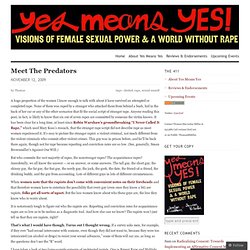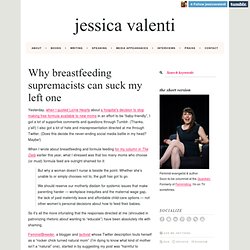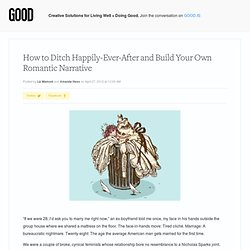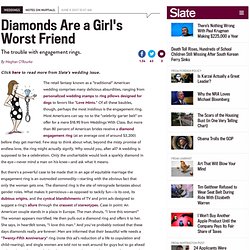

More Feminist Than Thou: Moving Beyond Self-Defeating "Choose My Choice" Feminism. I am so tired of “I choose my choice” feminism.

So, so tired of it. I just can’t have another fight about whether it’s possible to be a stay-at-home mom, shave your legs, wear makeup, date men, have rough sex, have submissive sex, change your name, watch porn, worship a Judeo-Christian God, shop at Wal-Mart, wear hijab, get breast implants, listen to hip-hop, go on a diet, eat meat, or wash the dishes and be a feminist at the same time. Let’s stop choosing our choices and start choosing our battles.
Choosing is passive. Choosing is not enough. Choose-your-choice feminism brought us, for example, the so-called Mommy Wars, which pits women against each other, instead of against anti-family work policies and the intersecting mechanics of economic oppression; it pits a very small group of “each others,” usually deeply privileged “each others” against those “each others” who blessedly have the option of choosing at all. Do our choices add up to the people we are and the world we live in? Why You Shouldn’t Tell That Random Girl On The Street That She’s Hot » Brute Reason. Have My Back: A Quick and Dirty Guide to Being An Ally. There are lots of really great, in-depth guides to being an ally, as well as some written to aid specific allies in specific contexts. They make the rounds every once a while, but often don’t seem to reach the people who need them. That’s why it didn’t surprise me that, at Eschaton this past weekend, one of the questions asked of the gender panel was, in essence, how to be a good one.
While Ophelia, Natalie, Ania, and PZ shed quite a bit of light onto the topic, I contributed this: Simply put, have my back. Don’t get in front of me and talk for me. Don’t stand off to the side and do nothing. It’s quite easy to see the problem with standing off to the side and doing nothing, but a bit harder to see how presumably supportive action can be problematic. I traveled to Eschaton on the red-eye on Thursday night.
This was a case of someone standing in front of me. Meet The Predators « A huge proportion of the women I know enough to talk with about it have survived an attempted or completed rape.

None of them was raped by a stranger who attacked them from behind a bush, hid in the back of her car or any of the other scenarios that fit the social script of stranger rape. Anyone reading this post, in fact, is likely to know that six out of seven rapes are committed by someone the victim knows. Legal Consent, Morning-After Regret, and “Accidental” Rape. Over the past few weeks, this blog has hosted some really productive discussion threads about rape prevention, victim blaming and new models for sexual consent.

I'd like to thank everybody who has participated, but I'd also like to directly address a few theories that have arisen over the course of these discussions. And I would like to begin the process of debunking them. Debunked, after the jump: - "Yes means yes" is dangerous in a world where "no means no" - Women exploit rape laws to criminalize consensual sex they later regret - Some rapes just happen on accident. Jessica Valenti — Why breastfeeding supremacists can suck my left one. Yesterday, when I quoted Lorrie Hearts about a hospital’s decision to stop making free formula available to new moms in an effort to be “baby-friendly”, I got a lot of supportive comments and questions through Tumblr.

(Thanks, y’all!) I also got a lot of hate and misrepresentation directed at me through Twitter. (Does this decide the never-ending social media battle in my head? Maybe!) When I wrote about breastfeeding and formula feeding for my column in The Daily earlier this year, what I stressed was that too many moms who choose (or must) formula feed are outright shamed for it: But why a woman doesn’t nurse is beside the point. Procreation vs. Overpopulation. In 1832, Charles Knowlton, a doctor in Ashfield, Massachusetts, published a short book with a long title: “Fruits of Philosophy: The Private Companion of Young Married People, by a Physician.”

Knowlton, who was thirty-one, was a “freethinker” and, by the standards of the Berkshires, an unusually adventurous soul. While attending the New Hampshire Medical Institute (now Dartmouth Medical School), he was too poor to pay for a dissecting class and so had liberated a corpse from a cemetery. For this, he was convicted of grave robbing and sentenced to sixty days in jail.
In 1829, he wrote up his ideas about agnosticism in a tract and had a thousand copies printed at his own expense. Unable to find buyers in western Massachusetts, he took the copies to New York City, where he was arrested for peddling without a license. How to Ditch Happily-Ever-After and Build Your Own Romantic Narrative - Lifestyle. “If we were 28, I’d ask you to marry me right now,” an ex-boyfriend told me once, my face in his hands outside the group house where we shared a mattress on the floor.

The face-in-hands move: Tired cliché. Marriage: A bureaucratic nightmare. Twenty-eight: The age the average American man gets married for the first time. Internalized gaslighting or, sorry I’m being so crazy. Engagement rings: good or bad? - By Meghan O'Rourke. Click here to read more from Slate's wedding issue.

The retail fantasy known as a "traditional" American wedding comprises many delicious absurdities, ranging from personalized wedding stamps to ring pillows designed for dogs to favors like "Love Mints. " Of all these baubles, though, perhaps the most insidious is the engagement ring. Most Americans can say no to the "celebrity garter belt" on offer for a mere $18.95 from Weddings With Class. But more than 80 percent of American brides receive a diamond engagement ring (at an average cost of around $3,200) before they get married. Few stop to think about what, beyond the misty promise of endless love, the ring might actually signify.
But there's a powerful case to be made that in an age of equitable marriage the engagement ring is an outmoded commodity—starting with the obvious fact that only the woman gets one. Wedding websites: Why I hate them. - By Noreen Malone. My roommate and I spent a solid hour on the couch one evening discussing a wedding Web site we'd been sent.

The people getting married were strangers, but that didn't stop me from forwarding it to a friend or two I thought might get a kick out of it. Pretty soon everyone had seen "Jane" and "Tim's" site, on which they treated their impending nuptials with all the pomp that preceded Princess Diana's wedding. Except Jane and Tim's wedding won't just be broadcast live on their special day, like Diana's paltry event was. In the months preceding their marriage you can watch the Flash slide show that explains how the pair met-cute while rooting for opposing teams during a Yankees-Red Sox game as many times as you want.
But that's only if you tire of the video showing Jane and Tim lovingly washing their dog, Mr. Sadly, Jane and Tim are not alone. The idea behind a formalized wedding is that the couple stands up in front of their family and friends and declares their love.